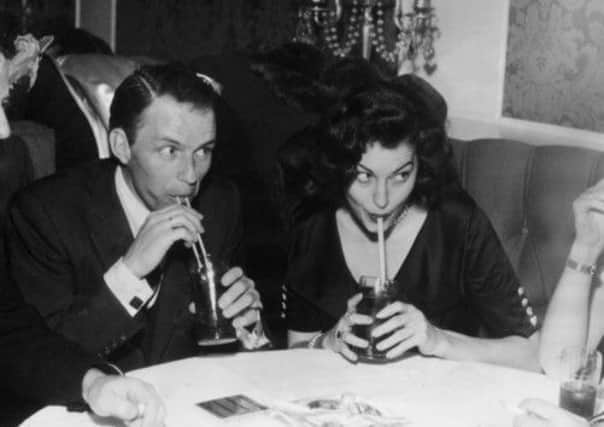Book review: Ava Gardner: The Secret Conversations


Ava Gardner: The Secret Conversations by Peter Evans and Ava Gardner
Simon & Schuster, 304pp, £20
She had no money and didn’t want to sell the jewels that Frank Sinatra, Howard Hughes and other famous men had lavished on her. “Pretty damn soon,” she frets to Evans, “there’s gonna be no corn in Egypt, baby.”
Advertisement
Hide AdWatching this still mesmerising Sunset Boulevard Scheherazade ply her mind games, sensuality and stubborn will on Evans, it’s easy to imagine what it was like to be a love object jerked on her marionette strings in her prime. You wouldn’t have a chance. “You can sum up my life in a sentence, honey,” she tells him in her throaty voice. “She made movies, she made out and she made a mess of her life. But she never made jam.”
The woman once promoted as “the world’s most beautiful animal” was partially paralysed on the left side of her face and so nervous of meeting the publisher for the book she and Evans had planned that she brought in Jack Cardiff, the cinematographer who had worked with her on The Barefoot Contessa, to light her Knightsbridge flat. Sitting under a key light, which cast the frozen side of her face into shadow, she beguiled the publisher. “Elizabeth Taylor is not beautiful, she is pretty,” she told him. “I was beautiful.”
Although her romance and subsequent short marriage to Mickey Rooney might seem incongruous, Ava speaks of the 5ft 2in Rooney fondly, noting that he went through the ladies like “a hot knife through fudge.” He stood up to Louis B. Mayer to marry her and taught his virgin bride how much she liked sex. “In bed,” she says, “I’ve always known I was on safe ground.” They laughed a lot in bed and she kept up a dalliance while they were getting a divorce.
Howard Hughes, by comparison, was “a low-key guy sexually” yet an insanely jealous control freak. The relationship was, of course, volatile. One night he dislocated her jaw and she nearly “put a lily in his hand” by throwing an onyx ashtray at his head. There was blood everywhere, Ava recalls, even “real blood in the Bloody Marys.”
After following her friend Lana Turner again (as she had done with Rooney and Hughes), she married Turner’s ex, Artie Shaw, an autocratic autodidact who constantly put her down.
Then she went to what a friend called “the University of Sinatra,” where the pair were “kissing the bottle,” drinking martinis with Scotch and bourbon chasers, scrapping and making up. They shot up a California town with .38s. She had an abortion. He got fired by MGM and had cry-for-help feints with suicide, including overdoses and firing a gun into a pillow to scare her while she was in the next room. As they waited for his divorce to Nancy to come through, she punished him by telling him about a fling with a bullfighter.
Advertisement
Hide AdSinatra always said that when people looked at them as a couple, every guy wanted to be him and every girl wanted to be her. But it doesn’t sound so great from the inside.
She visited Frank when he was playing to half-empty houses in Italy. “I had to have been in love with him to sit through those performances,” she recalls. “Let’s say he was not at his best.”
Advertisement
Hide AdShe adds: “He did a record with Harry James that was so bad, I cried when I heard it. I couldn’t listen to it with him ... Poor baby, I was the star in the ascendancy and he was on his ass. No matter what I did, his having to rely on a woman to foot some of the bills - most of them, actually – made it all so much worse.” Ava disputes stories that the Mafia was taking care of Frank. The “so-called Family was nowhere to be seen when he needed them,” she says.
She says they were too much alike. Her sister told her she was “Frank in drag.” Lana Turner warned against marrying him, but Ava explains that “you don’t pay much attention to what other people tell you when a guy’s good in the feathers.”
“I tried to be a good wife,” she tells Evans. “I tried to be any kind of wife; the plain fact is, I just wasn’t meant to ride off into the sunset and live happily ever after.”
Asked if she regretted not having kids, she replies wearily, “How many people do you know who haven’t made mistakes in their lives, who’ve lived completely without vices, baby?”
She may have missed fighting with Frank but not with George C Scott. When he was drunk, he would beat her, and the next morning, “I’d be lying next to him, black-and-blue and bleeding, and he couldn’t remember a thing.”
Her book with Evans was never published in her lifetime and Evans speculates that Sinatra paid her the amount she would have earned from it. Its appearance now is only because Evans – who died while completing the book – secured permission from her former manager, now in charge of her estate. One can only imagine how she would have turned the air blue at such a blatant reversal of her wishes.